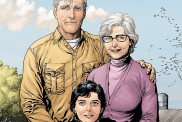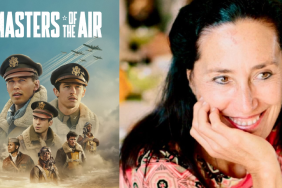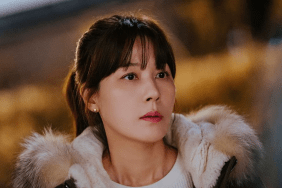It’s probably better to not know very much about the real-life crime behind Tommy O’Haver’s drama An American Crime before seeing the movie, but clearly, what makes the film special are the intense performances from Catherine Keener and Ellen Page. Keener plays Gertrude Baniszewski, an Indianapolis housewife and single mother of five, who temporarily takes in 16-year-old Sylvia Likens (Page) and her younger sister Jennie in 1965, only to abuse and brutally torture Sylvia in a case that shocked the country.
ComingSoon.net spoke with Keener and Page during a slew of interviews done at this year’s Sundance Film Festival. (Note: There are minor spoilers in this interview for anyone who doesn’t know the details of the stories of Gertrude Baniszewski and Sylvia Likens)
ComingSoon.net: Normally, the topic of child abuse is not something you’d want to get into, so why did you decide to do this film?
Catherine Keener: Because it’s normally a topic that you don’t want to get into, I think, and I don’t understand why that should be kept that way. It’s just awful and horrible. There’s sort of this taboo about the subject of child abuse, and I think it just should be busted wide open. Secrets aren’t helping make it go away, and it has to stop. I just feel that if we can contribute to a little bit of discussion for it, then good.
CS: Considering the terrible things Gertrude did, how hard was it not to judge your character?
Keener: Oh, I judged her. (laughs) I didn’t judge her when I was playing her, but I definitely have an opinion of who the bad guy is. Sylvia and the other children, as far as I’m concerned, are the victims of the piece, and she’s the villain.
CS: How would you describe this character? Complex but pathetic?
Keener: That’s a nice way to say it. I think those two things are true, but also “monster” comes to mind. Human beings tend to do really horrific things, crimes, and it was a grown-up who probably wasn’t helped any along the way when she should have been, but she chose to do those things.
CS: Can you talk about the group dynamic of the torture and how you approached that?
Keener: Why does that happen? I really don’t know about that, but it’s not uncommon at all, unfortunately. I can imagine a lot of things, because it had to do with her children and the warped, misguided way that she loved them, if you call it that, and their search for that kind of love and what they thought would make their mother feel better. She was really sick, and I don’t know, kids feel responsible and that’s what happens with children. They’re responsible for everything. I can see everyone just kind of joining in this sort of mob mentality.
CS: Ellen, how did it feel to be on the other side of the torture scenes this time and how did you prepare for them?
Ellen Page: Basically I read everything I could get my hands on regarding Sylvia and the case, as well as the psychology of abuse victims and torture victims, specifically children, and just kind of attached my heart to it and dove into it.

CS: How did you build the dynamics between the two characters both on-screen and off?
Keener: I knew of Ellen just because I’m a fan. I had seen “Hard Candy” and like everyone else, was blown away by her. When I heard she was interested, it definitely added to the credibility of the whole thing. For me, I just assumed we were going to be partners and we were. We were in it together and for each other, whichever way we had to go.
CS: Was there a building of trust in the beginning?
Keener: Yeah, but building of trust to go extremely in the bad direction, too, but again, with that understanding that we are not these two people, we’re not experiencing their pain, their hideousness, that we really do love each other, the two of us, so whether you’re conscious of it or not in the moment, you feel it.
CS: Was there a lot of tension on-set while doing these scenes?
Page: Yeah, the crew put their heart into it, just as much as we did.
Keener: They did, actually.
Page: It could be very intense. Catherine was so good at being into the kids. I was just a jerk.
Keener: She had the hardest part. I was a mom, so that was particularly in my area of responsibility, to make sure the kids knew it was me and not Gertrude and that I loved them. We were playing hard, but it was not real. Actually, they did me a tremendous favor, their presence alone allowed me to come out of that crap. I learned so much from these kids. It was like, “Oh jeez, you mean I can just trust that I’ll be present and I’ll get there.” We both had our moments of “BE QUIET!” frustration when we weren’t that nice. It was surprising to me how the crew so got into the movie. Everyone just raised the bar and the best thing to do is just get through it.
CS: What parts of Sylvia’s torture were left out of the film?
Page: What she went through is truly and utterly nauseating, inconceivable. It’s far worse than the film. If people want to learn about it, they can find it on the Internet and read up on it. It’s just absolutely atrocious, and if this was even three quarters of that, it would be unwatchable.
CS: Is the increasing violence to her a plausible progression?
Keener: It is scary the worse things get, the violence escalates and that’s typical, apparently. That was the thing, I could see the reasons
f**k that, but I can see it. I think that we as a society don’t do anything to help these people at all. The poverty and the children and this and that, the trauma and everything that we know now. We know these things now, and it’s still a sad situation.
CS: Did you feel a sense of rage from this story?
Keener: Yeah, I’m pretty outraged that this happened and that it continues to happen.
CS: Was there ever discussion about current cases of this sort of abuse taking place in the world, like the recent story of the boys who were held for four years?
Keener: The question to ask is, why did these adults do this? There are so many reasons why these kids don’t leave, but they’re kids, and they trust grownups. They think what they say is true.
Page: No matter what age you are, too, when there’s constant abuse day in and day out, you lose the ability to be relative. It becomes normal, and you start blaming yourself and you start justifying it because other people are justifying it.
CS: Catherine, why did you decide not to talk to anyone involved in the case like Gertrude’s family?
Keener: I didn’t know of anybody. I know an older sister lives in California somewhere, and I found that out through reading the New York Times article on it, and that she’s upset about it and I can understand that. There wasn’t anybody available for me to talk to about it. Plus Gertrude, there was so little about who she was, how she felt, what happened to her. There are things that are touched upon, growing up, but for me the story is taking place at a time when she is the perpetrator, she is the criminal and Sylvia and the kids are the victims and that was the present for me.

CS: What do you think the men in Gertrude’s life brought to this situation?
Keener: Again, I don’t know if it’s the actual Gertrude story, but I just imagined her to be so stuck in that place, never having a shot at being the pretty girl with a proper upbringing and stuff, got pregnant early and beaten all the time by her husband. She lived in utter denial and resentment. The little bit I do know about Gertrude is that she was really close to her father and witnessed him dying of a heart attack at a young age. I don’t think she had a good relationship with her mom, so because she was so close to her father, I can see the pleasing the men part.
CS: Do you know what happened to Gertie’s kids after what we see in the movie?
Keener: Tommy and Irene [the film’s co-writer] know more. I remember that John became a minister, and they had no sympathy for Gertrude.
CS: What do you think a movie like this says about our interest in this kind of material or behavior?
Keener: I don’t know what to say about that, because I don’t want to taint it with any suspect reasons for being fascinated by it. Hopefully, it’s because maybe there are a lot of people who care about things and children, and maybe it will provoke discussion. I don’t know about that purient side, I know it exists. It feels skeezy to me.
CS: Do you look away from things like this or seek them out as an artist?
Keener: I saw a movie a friend of mine did, called “Deliver Us From Evil,” it’s a great movie. That was a movie I didn’t want to see, but I forced myself to and couldn’t get anyone to see it with me, so I had to brave it alone. I feel like I can give myself a “brave patch” for seeing that movie. I came out of it feeling so much better informed, and that I faced that grotesque, monstrous, sickening story. Now, I feel it’s a little bit easier to talk about, and I think it’s a subject that should be talked about, so I think it’s the right thing to do, to go see these movies. I feel different about this movie, because I don’t feel Tommy was exploitive in the rendering of the story.
CS: How did you recover from making a movie like this?
Keener: I went to Australia, the beautiful, natural environment of Australia, and played with wild things, that helped a lot.
Page: I ran away to Nova Scotia. It was the summer and I swam in lakes everyday and drank really yummy coffee and tried to not keep obsessing, because I’m kind of obsessive and I really needed to separate myself because it’s not a easy thing on the mind and body.
Keener: Somebody told me that a lot of people who were abused as children seek, in their later lives, seek solace in nature. I found it interesting in that even going through the pretend thing, we both did the same thing, just ran for the hills. I guess it’s not an uncommon thing and I can understand it. That’s where you can feel hopeful again.
CS: What was the reaction for the film like at its Sundance premiere?
Keener: I didn’t stay, but I heard a person unfortunately fell ill at some critical point in the movie and it freaked people out.
Page: No, I went for a bit and left. As much as I love myself
Keener: And we do
Page: Yes. No, that’s completely untrue. I have a lot of trouble watching myself and I have a lot of trouble watching myself being branded by Catherine Keener.
Keener: I don’t like that image at all.
An American Crime is now playing at the Sundance Film Festival and will be released in select cities this summer by First Look Pictures.









